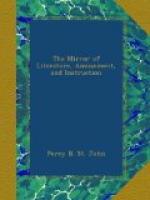A Literary Dinner! apparently the remains of the Seven Young Men sprinkled along both sides of the table—with here and there “a three-times skimmed sky-blue” interposed; on each side of the Lord of the Mansion, a philosopher—on each hand of the lady, a poet—somewhere or other about the board, a Theatrical Star—a Strange Fiddler—an Outlandish Traveller—and a Spanish Refugee. As Mr. Wordsworth rather naughtily sayeth,
“All silent, and all damn’d!”
Still the roof does not fall, although the chandelier burns dim in sympathy,
“And all the air a solemn stillness holds.”
Will not a single soul in all this wide world, as he hopes to be saved, utter so much as one solitary syllable? Oh! what would not the lady and the gentleman of the house give even for a remark on the weather from the mouth of poet, philosopher, sage, or hero! Hermetically sealed! Lo! the author of the very five-guinea quarto, that lay open, in complimentary exposure, at a plate, up stairs on the drawing-room table—with his round unmeaning face “breathing tranquillity”—sound asleep! With eyes fixed on the ceiling, sits at his side the profound Parent of a Treatise on the Sinking Fund. The absent gentleman, who has kept stroking his chin for the last half hour, as if considering how he is off for soap,—would you believe it,—has just returned from abroad, and has long been justly celebrated for his conversational talents in all the coteries and courts of Europe. If that lank-and-leather-jawed gentleman, with complexion bespeaking a temperament dry and adust, and who has long been sedulously occupied in feeling the edge of his fruit-knife with the ball of his thumb—do not commit suicide before September,—Lavater must have been as great a goose as Gall. You might not only hear a mouse stirring—a pin dropping—but either event would rouse the whole company like a peal of thunder. You may have seen Madame Toussaud’s images,—Napoleon, Wellington, Scott, Canning, all sitting together, in full fig, with faces and figures in opposite directions, each looking as like himself as possible, so that you could almost believe you heard them speak. You get rather angry—you wonder that they don’t speak. Even so with those living images. But the exhibition is over—the ladies leave the room—and after another hour of silence, more profound than that of the grave, all the images simultaneously rise up and—no wonder people believe in ghosts—disappear.
A Return Dinner! Thirty people of all sorts and sizes, jammed—glued together—shoulder to shoulder—knee to knee—all with their elbows in each other’s stomachs—most faces as red as fire, in spite of all those floods of perspiration—two landed gentlemen from the Highlands—a professor—four officers, naval and military, in his Majesty’s and in the Company’s service—some advocates—two persons like ministers—abundance of W.S.’s of course—an accoucheur—old ladies with extraordinary things upon their heads,




